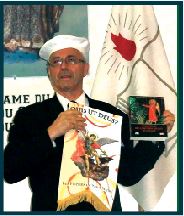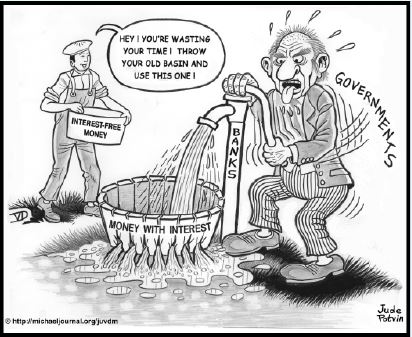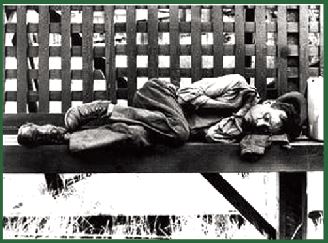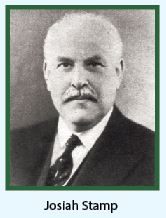 Here is a conference done by Mr. Marcel Lefebvre during our week of study in August of 2011:
Here is a conference done by Mr. Marcel Lefebvre during our week of study in August of 2011:
What we are going to talk about today and during the course of the week is about how to resolve a major problem for humanity: the scandal of poverty amidst plenty.
If we did not have abundance, we could “share” the wealth but now, instead, we distribute the materials of death and destruction and we restrict what the human beings need. In 1934, when Louis Even discovered the propositions of Douglas, a Scottish economist-engineer, he said, “This is a light on my path, all the world must know about this.” He found this light in a small book entitled: From Debt to Prosperity by J. Crate Larkin. Louis Even had seen for himself the cause of the economic crisis. In 1934, there was intense misery in Montreal in front of abundant products, there was only the permit to buy that was missing.
Mr. Even knew the Social Doctrine of the Church but there were no precise methods at that time to apply it. Louis Even was searching for a means and providentially he found this little book.
He consecrated the last 40 years of his life to make this light known. In 1937, he even left his job because he thought that the weekends and the evenings after work did not give him enough time to make it known. So, Providence intervened and he threw himself into an impressive adventure, to bring a light to a principle cause of poverty in the world.
In a document that we have distributed by millions in different languages, we mention the words of Bl. Pope John Paul II: “It is urgent to put an end to the scandal of poverty in the world! The most urgent reform is to correct the financial system.” The problem is found in the financial system but the media is careful not to point this out.
In 1931, in his encyclical letter Quadragisimo Anno, Pope Pius XI denounced those who control the money and credit of nations. “They distribute it,” he said, “in such a way that they hold the life-blood of the economic organism in their hands.” He added that the governments are stripped of their noble role and have become slaves of the powerful financiers. Those who control money, control also the media and the formation of economists to maintain the present financial system.
Paul VI wrote in his encyclical Populorum Progressio in 1967, about the “calamitous system that is accompanying capitalism.” This does not mean that we should throw out capitalism. It is not because of private property or free enterprise that we have this economic problem. Free enterprise furnishes products in abundance and even super-abundance but the financial system that accompanies the system of capitalist production is not at all at the service of production.
 Nations can produce in abundance but if there are people who decide to close the faucet [of money], the money will disappear and nations will suffer from a lack “signs” or money, which are not the true riches of a country. The riches of a country is the bread, it is consumable goods. But today it is the sign that leaves reality behind. Bl. Pope John Paul II accused the “calamitous” system of being a “structure of sin.” Because of this “calamitous system,” nations owe millions of dollars.
Nations can produce in abundance but if there are people who decide to close the faucet [of money], the money will disappear and nations will suffer from a lack “signs” or money, which are not the true riches of a country. The riches of a country is the bread, it is consumable goods. But today it is the sign that leaves reality behind. Bl. Pope John Paul II accused the “calamitous” system of being a “structure of sin.” Because of this “calamitous system,” nations owe millions of dollars.
In 1980, 75 bishops from Latin America gathered to protest against the International Monetary Fund (IMF) and the World Bank who had lent them 80 billion dollars for development purposes. After 10 years, these countries had paid 418 billion dollars in interest, more than 5 times the amount received. And they still owe their debt even today. It is not without good reason that Bl. Pope John Paul II demanded to erase the debts of the countries for the Jubilee of the year 2000. Erase the debts of all the countries! There is no other solution. In order to pay the debt, nations pay interest on their debts and their people work to export outside the country. They cannot even profit from their own production.
I went to the Congo and they told me: “There are businessmen here who have not received their salary for the last 10 months!” Why? Because the government decided to send all that they could grab to the IMF and the World Bank to pay the interest on a debt that they have already paid many times over! There is no possibility to develop a country in this kind of system.
In Canada, we have an institution called the Bank of Canada. A question regarding the banks and commerce was asked of Graham Tower, first governor of the Bank of Canada, during a session with the Parliamentary Commission in 1935. The question was: “Will you tell me why a government with the power to create money should give that power away to a private monopoly and then borrow that which Parliament can create itself, back at interest, to the point of national bankruptcy?” He replied: “Now, if Parliament wants to change the form of operating the banking system, that is certainly within the power of Parliament.” The Canadian Constitution says that the power to create its own money and regulate its value belongs to the central, or federal, government.

But since that time nothing has changed. Our current Prime Minister still borrows today from the monopoly of private banks. And because they have borrowed 39 billion dollars from this monopoly for the services to the different Departments and to the population, the Canadian debt has now attained 562 billion dollars, since 2002. 562 billion dollars of this debt was in order to obtain services worth 39 billion. This is truly a perverted system!
St. Louis, the King of France, said: “The first duty of a king is to create his own money in order to facilitate the exchange of goods among his subjects.” What government makes its own money today? No-one!
A handful of individuals have usurped the power to create money. In Canada, it was in 1913 that the privilege to create money was ceded to private monopolies. In the United States, this happened on December 23, 1913. A small number of deputies voted in the law of the Federal Reserve, a private organism that has control over the monopoly of the creation of money.
We are presently living in a financial crisis; this does not come from God. God still sends the sun and the rain. Production is in sufficient quantity to feed humanity; but a small number of individuals have their hand on the faucet of money and they close it in times of peace. What is curious about this is that in times of destruction and war; the faucet of money is opened and there is money in abundance. This system does not come from God! So, when a financial crisis occurs, people lose their jobs, goods and homes.
Millions of American families lost their homes; President George Bush did not have a dime with which to come to their aid. On the other hand, just before leaving the White House, he was able to find 700 billion dollars in order to come to the assistance of the poor bankers. It was not possible to leave the bankers in difficulty! The families are left in the street, without a problem, but throw the banks into the street? No, it is not possible! And where did President Bush find the 700 billion dollars to come to the assistance of the banks? From the Federal Reserve Bank!

Is the Federal Reserve Bank at the head of all the American people? Is it the bank of the United States? Not at all! It is the private bankers of the Federal Reserve who loaned 700 billion dollars to President Bush but they lent it not in bills or in numbers but in numbers typed into a bank computer! Numbers typed into a computer owned by Federal Reserve Bank brought billions of dollars to life. The bankers who write these amounts make themselves the proprietors of numbers that are put on paper or in a computer, after which they oblige the populations to pay the interest on.
It is the poor who have lost their houses that now have the “obligation” to pay interest on the 700 billion dollars lent by the banks, on top of the interest on the 15,000 billion of the federal debt.
 An unbreakable wall
An unbreakable wallWe were struck by a speech given by Cardinal Bernard Agre in Rome, in 2004. While he was a member of the Pontifical Council of Justice and Peace, the Cardinal spoke about the banks as an unbreakable wall that destroys Africa. He said that it was not with interest changes of 17 or 20 percent that we will be able develop Africa.
He was right! We invited Cardinal Agre to come to our week of study on the question of the Social Doctrine of the Catholic Church and its application. He accepted very quickly and came to see us in June of 2008. The second day of the courses, he gave a small reflection: “If I have understood well what you have just revealed here: it is that the private banks create money out nothing and become the proprietors of everything!” The Cardinal understood well.
It is Mayer Amschell Rothschild who said, “Let me control and issue the currency of a nation, and I care not who makes its laws.” In the 1700’s, in the five greatest capitals in Europe; he placed his five sons at the head of each countries private bank. This system has spread throughout the entire planet and every country is under its domination.
 Banking was conceived in iniquity
Banking was conceived in iniquityIn 1940, Sir Josiah Stamp, who was governor of the Bank of England, stated: “Banking was conceived in iniquity and born in sin.“ “The bankers own the earth,” he said. Words from a banker, this is indeed astonishing! We are not speaking here of the small bankers on the street corners, but the international bankers, people of the caliber of Rockefeller, Rothschild and others. They are not the majority.
“Take the earth away from them,” said Sir Josiah Stamp, “but leave them the power to create money and control credit, and with the flick of a pen, they will create enough money to buy it back again.”
So this is the problem that we are going to study in-depth during the week of study. But we will quote now a person who made a mark in history, Benjamin Franklin, one of the Founding Fathers of the United States, born in Boston in 1706. In 1750, he was governor of Pennsylvania, in what is called New England. He stated: “Impossible to find a happier or more prosperous population on all the surface of the globe!” The English authorities asked: “What is your secret?” England was then passing through a very difficult time, a crisis. There was unemployment, bankruptcies and prisons were full to bursting. However, the colonies were in the development stage and were flourishing well.
Benjamin Franklin replied: “That is simple, in the Colonies we issue our own money. It is called Colonial Scrip. We issue it in proper proportion to make the products pass easily from the producers to the consumers.”
The goal of production is consumption. The farmer does not cultivate his fields to destroy them afterwards; he cultivates them so that they can be consumed. The role of money should always be to facilitate the exchange of products but when it becomes a means of control and domination, it does not have the same effect.
 Franklin continued: “In this manner, creating ourselves our own paper money, we control its purchasing power, and we have no interest to pay to no one.” This is the secret to the prosperity in New England during those years.
Franklin continued: “In this manner, creating ourselves our own paper money, we control its purchasing power, and we have no interest to pay to no one.” This is the secret to the prosperity in New England during those years.
Just to give our readers an example of what happened in Canada when Canada ceded the power to create their own money to private banks: after borrowing 38 billion dollars for services to the population, the debt attained 562 billon dollars, because of compound interest, accumulated every year. The national budget is 7%. There were years that Canada paid 42 billon in interest after obtaining a loan of 39 billion. This is good business, is it not? It is the most prosperous enterprise that exists today.
When the bankers learnt the formula, the secret of Franklin, they intervened and passed a law forbidding the colonies to create their own money. They obliged them to borrow money from the Bank of England, which was a private bank and not the bank of the king. After one year, the situation was reversed and the colonies were in crisis, a misery just as great as in England because now they had the same financial system. This is where we see how a system at the service of society permits the development of the country; but in contrast the system at the service of a small group of profiteers drags the country into slavery.
People told us, when we were working in Africa, that they were celebrating the 50th anniversary of their independence. But what exactly do they mean by independence? Those who colonized the countries were thrown out. Through monetary procedures, they were replaced by colonists who do not even live in Africa but reside outside the country. When the International Monetary Fund and the World Bank create one billon dollars for a country, at the end of the year, they demand huge amounts of interest on the loan. Cardinal Agre told us: “In Africa, we often have 20% interest on the loans.” The problem is then that the billions of dollars of interest do not exist because they were never created!
Cardinal Agre saw the reality of the situation. He told us when we were in Abidjan with him: “When I left your house, you filled my suitcases with literature; I left it with the President of the National Assembly in the Ivory Coast. A little while later, we met by accident. The President came to me and said: ‘Your Eminence, it is a true bomb that you put into my hands the other day! We must discuss this in greater detail at a later date.’”
The procedure, the technique of this “nefarious system,” is to divide the countries and world, in order to gain complete control. Here, we cause the French and the English to fight; in the United States it was white against black, in Ireland, Catholic against Protestant. In certain countries of Africa, the different ethnicities are fighting against each other. While we are busy fighting, the bankers are taking all the natural resources, destroying populations and countries. Today there is total control over all of humanity.
Here we wish to speak about the fable of Salvation Island, written by Louis Even. This story helps us understand the banking system. Mr. Even had a gift to help the people to understand, explaining the subject to them in a simple way. He knew how to give his audience, his students, a clear and effective teaching. Salvation Island helps us to see the situation of each one of our countries.
We invite you to read and deepen your understanding of the financial system by reading these books; Social Credit explained in 10 lessons, a study prepared by Alain Pilote, the book In this Age of Plenty, by Louis Even and the book From Debt to Prosperity by J. Crate Larkin. (See page 20 for prices.)